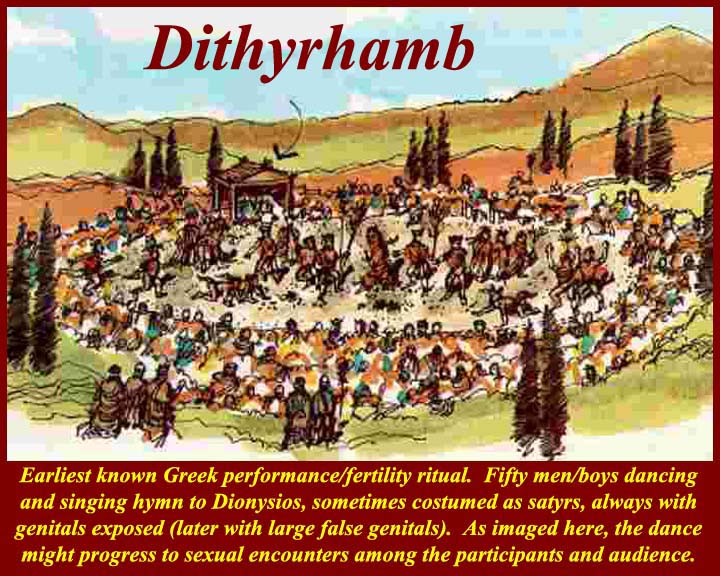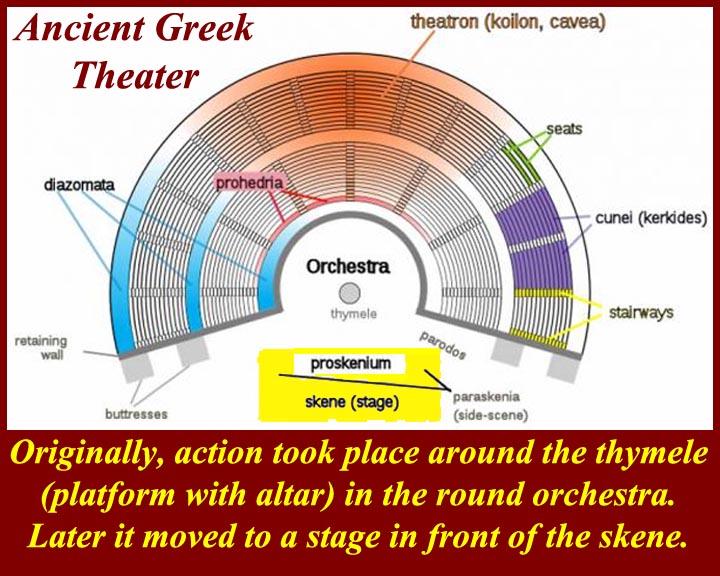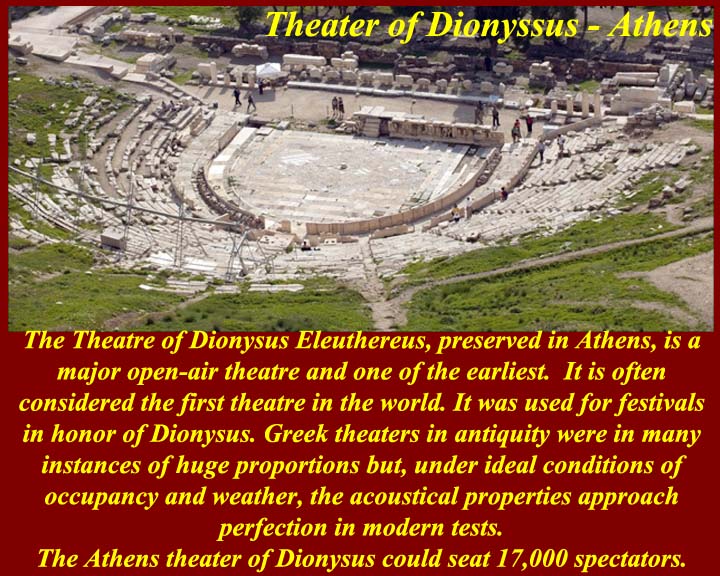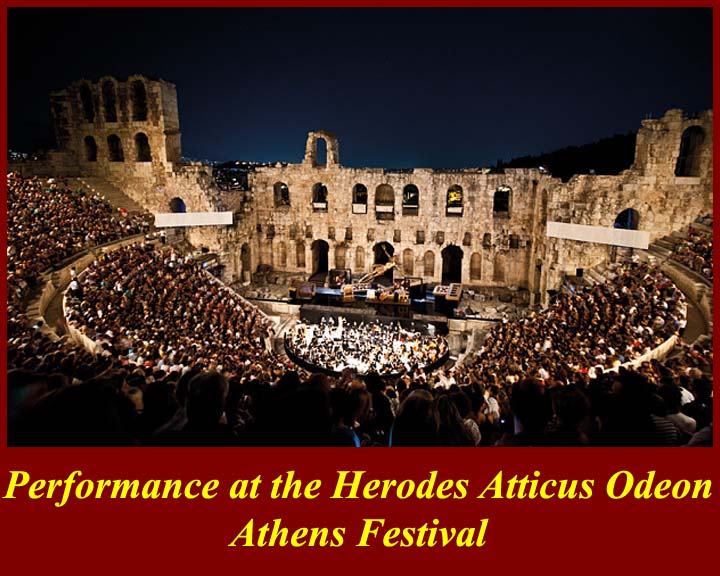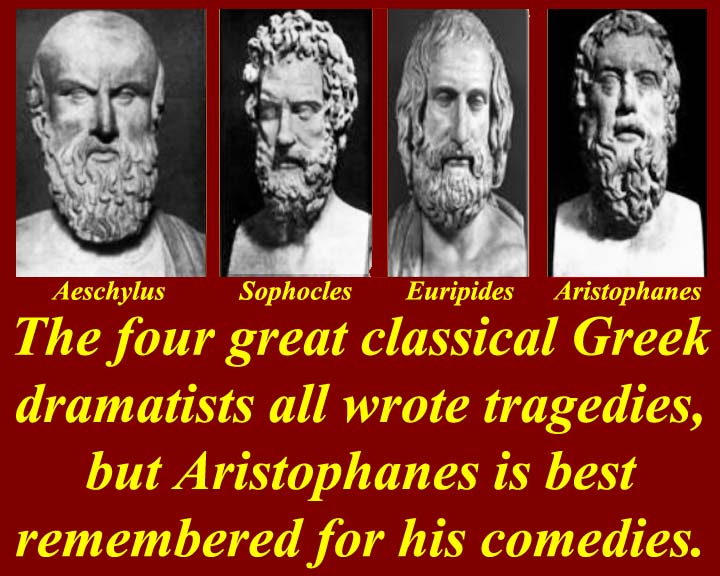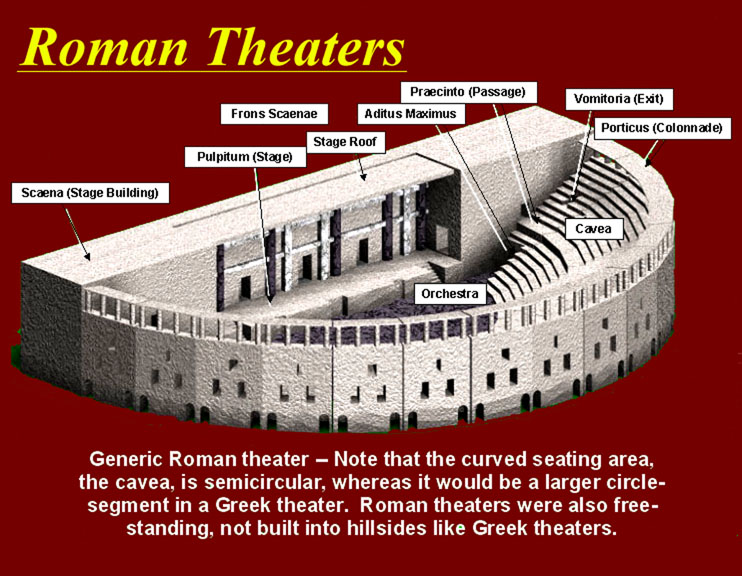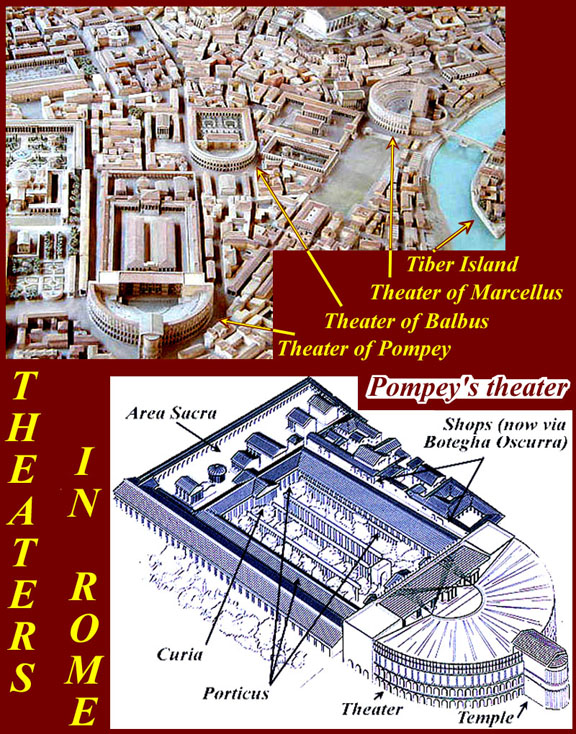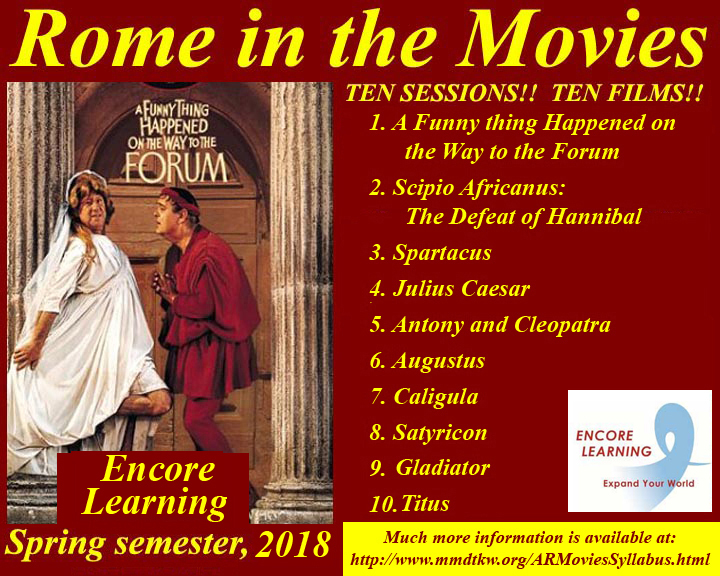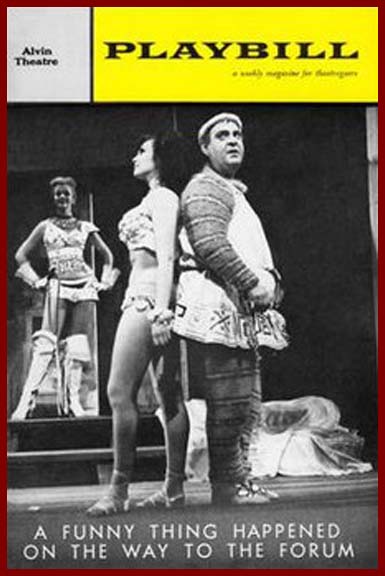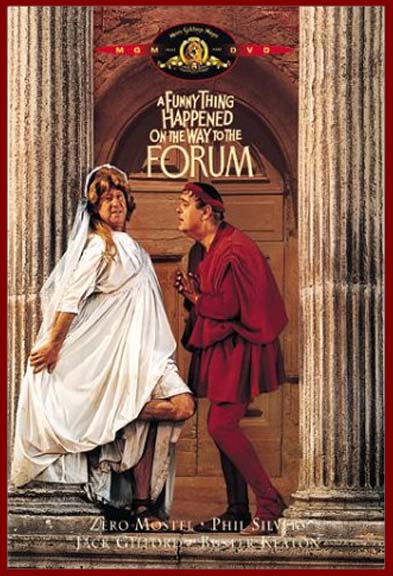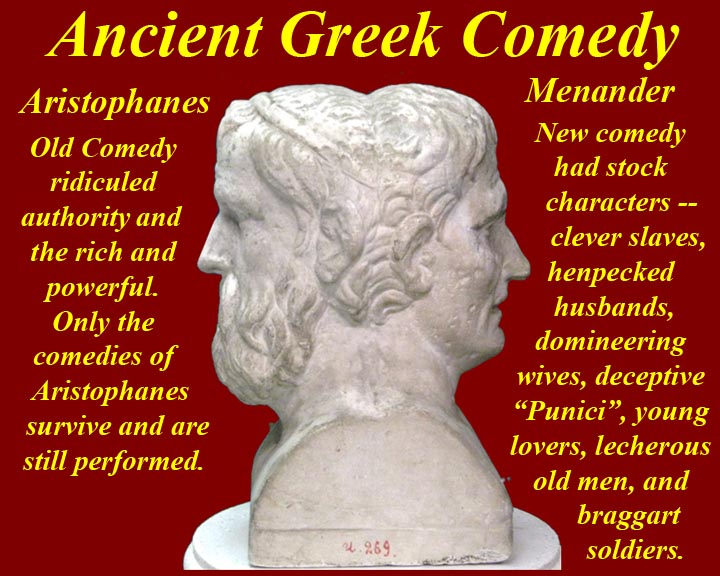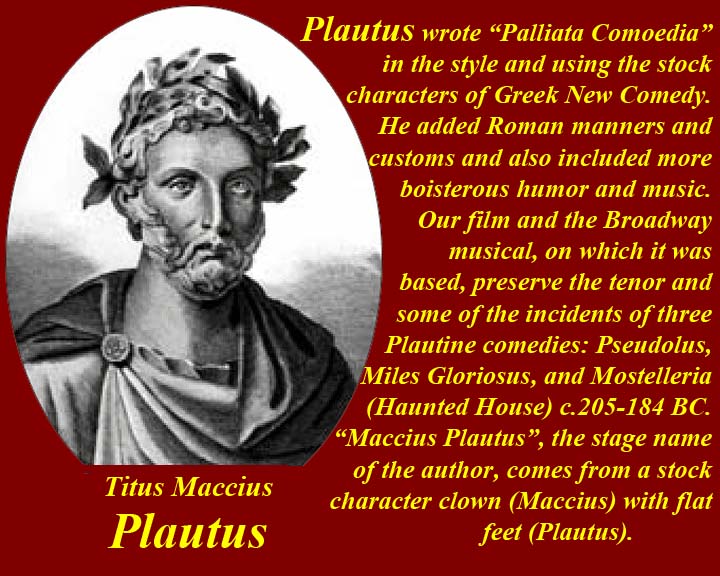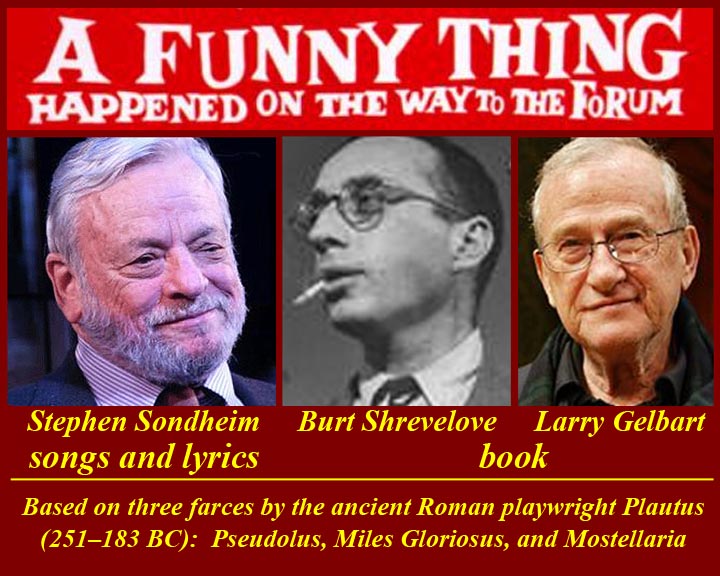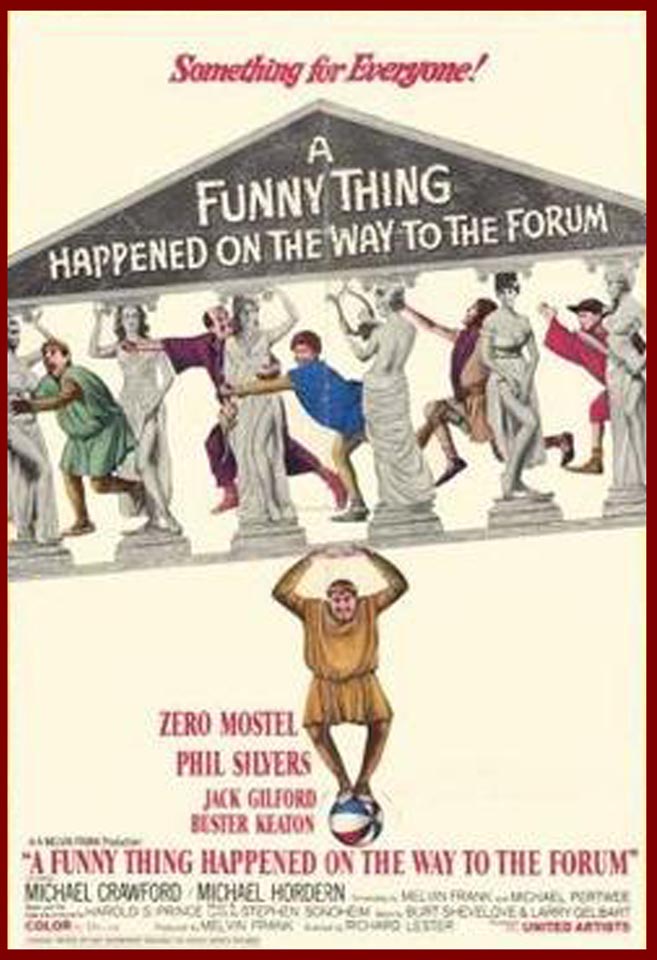Ancient Rome in the Movies --
development of performance and "A Funny thing...."
Where does theater start?
The first known "theatrical" events (i.e., performance in front of an audience) were the dithyramboi of ancient Greece, choral songs in honor of the wind god Dionysus. The form was known at least as early as the 7th century BC. According to accounts, groups of fifty men, costumed and masked as goats or satyrs (with genitals exposed) would perform a dance and chant routine in front of a Dionysus temple and surrounded by men and women of the town. A lot of drinking an ad hoc sex (with women audience members as well as with each other) was involved.
It didn't take long before purpose built structures came into use as venues for performances, and these developed into recognizable ancient "Greek theaters".
In ancient Greece performances were always associated with Dionysus: The thymele was a sacrificial alter to the god and, initially, all the action (the performance, i.e., the chant and dance, by the chorus) took place in the orchestra. The skene represented the Dionysian temple. Later, first a single "actor" (who had started out as the leader of the chorus) mounted the stage and the performance became antiphonal. A second actor and then more were added on the stage, and the choral singing/chanting became a commentary on the stage action. When the skene became monumental, a separate Dionysus temple was retained, usually behind the skene.
The theater art form was called "tragedy", from Greek tragoidia, apparently from tragos (goat, reason not really explained but most likely related to Dionysus) and Greek oide (song or ode).
"Greek" theaters were always open-air and built into a bowl shaped hillside and retained the circular orchestra and thymele. The prototype Greek theater was the Theater of Dionysus in Athens. Later "Roman" theaters had semi-circular orchestras and all the action took place on the raised stage.
A smaller type of venue, roofed and enclosed, later developed for the singing of odes. A single performer, the composer of the ode, would accompany himself (with a lyre) in the unlighted hall.
there was no action -- that was left to the imagination of the audience members.
The roof of the Herodes Atticus Odeon in Athens did not survive. Even though it is the "smaller" venue, it seats about 5000.
The four most famous ancient Greek dramatists
Theater in ancient Greece, and later in Rome, was competitive -- prizes were awarded in the annual contests -- for the best or most acclaimed tragedies and comedies.
The word comedy comes from Greek komoidia, from komoidos, a comic poet, from komos, revel and aoidos, singer. Comedies were shorter performances and came in two phases, the first of which, "old comedy" is best represented by Aristophanes, some of whose comedies were so well liked that they were preserved and are still performed both in ancient Greek and in translation.
---------------------------------------------
Roman theaters, which were free standing structures, developed from Greek theaters and were hallmarks of Roman cities throughout the Roman world.
There were three stone theaters in Rome itself. There had been earlier theaters in the city, but they were wooden structures, which were erected for specific events (ludi, usually translated as "games" but really meaning contests -- they were held in conjunction with gladiatorial ludi). After the ludi finished the wooden theater would be dismantled. It appears that the Romans initially thought that permanent stone theaters would somehow defile the pomerium, the area within Rome's sacred boundary.
Pompey Magnus overcame that superstition by pretending that his theater in the Campus Martius was a temple of Venus with curved steps (actually a theater cavea or seating area).
Greek theaters usually had openings in the skene and a good view of the sea or a broad valley over the top of the skene. Roman theaters often were built in urban areas with little opportunity for scenic views. (Note the use of the word "scenic" in that sentence -- a "scenic view" was originally the view through the openings of the skene or over the top of the skene of a Greek theater.)
Roman theaters usually had a rectangular area (porticus) behind the skene where the audience could take a break during or between productions to buy food or relieve themselves -- theater ludi were all day affairs. At the far end of the rectangular area there would be a meeting hall (curia).
The curia at the end of the Theater of Pompey was where Julius Caesar was assassinated. The old curia in the forum had been destroyed by fire in a riot and its replacement, the new Curia Julia (funded by Julius Caesar) was not yet finished.
------------------------------------
Our course and the first flick
The Broadway Playbill:
The movie poster:
Both the Broadway musical comedy and the movie that followed it starred Zero Mostel as Pseudolus the scheming slave. Both productions were derived from three ancient comedies.
The ultimate source of "A Funny Thing ..." was the second phase of ancient Greek comedy ("New Comedy"), which was best exemplified by Menander. The "Old Comedy" of Aristophanes was aimed at the powers-that-be of Athens and at current events -- think of Will Rogers or of late night TV comedians of today ridiculing politicians. "New Comedy" was more generic and featured stock characters in life situations (sitcoms?). No complete Greek "New Comedies" have been found, but we know of them from contemporary descriptions and excerpts and from Roman adaptations, especially those by a Roman playwright/actor from about 200 BC called Plautus, several of which survive and are still produced.
A funny Thing Happened on the Way to the Forum is a pastiche of three Plautine (= the word used to describe the plays of Plautus and of his genre) plays: Pseudolus about the machinations of a slave trying to get free; Miles Gloriosus about a bragart soldier; and Mostelleria about a haunted house.
The modern adaptation of the thee Plautine plays:

